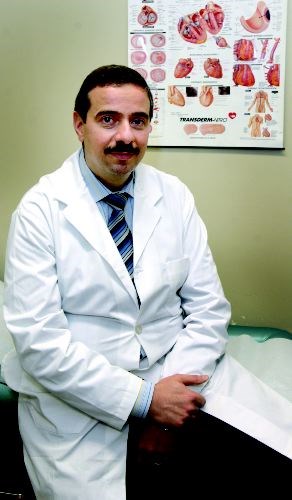Whenever an actor on screen grabs his chest with a pained expression and a bright red face, the audience is conditioned to know he's suffering a heart attack.
Hollywood's portrayal of the condition isn't totally off base - many people who suffer a sudden heart attack feel a crushing pain in their chest, neck and arm. Unfortunately, some people who don't have the classic symptoms of the condition fail to recognize they're also experiencing a heart attack.
"With a heart attack, it's critical that a patient is seen as soon as possible to receive the appropriate care," Prince George internal medicine specialist Dr. Firas Mansour said. "A delay in care generally causes more damage to the heart muscle."
Among the less common heart attack symptoms are a shortness of breath and a sudden feeling of weakness, which Mansour said some people attribute to having a cold or the flu. Occasionally people will take a few days to rest, waiting for the symptoms to clear up, not knowing they had a heart attack.
Mansour said people should be particularly concerned if the less typical symptoms occur when someone is exterting themselves - even lightly - and the symptoms go away when the person is at rest.
"Any symptom related to exertion is alarming," he said. "If you have heartburn when you walk and the heartburn resolves when you stop walking or when you're resting, then that's not related to the stomach illness - that's something most likely related to the heart."
Some people dismiss heart attack symptoms due to the lack of a severe pain in their chest.
"Sometimes people think of pain as something that has to really hurt, but any type of discomfort in the chest [can be a sign]," Mansour said. "Sometimes people just feel tightness in the chest, they don't feel any pain."
In rare cases, heart attacks are discovered well after the fact because there was no one incident the patient identifies.
"In some individuals we discover that they've had heart attacks when we're doing tests," Mansour said. "But you can't find an incident that could explain the signs and the results of the heart test."
People with elevated risk factors, like high blood pressure, high cholesterol or diabetes should be even more aware of the subtle symptoms and act when they occur.
"They should seek immediate medical attention if they feel unwell for no clear reason," he said.
In addition to atypical symptoms, Mansour said there are also warning signs that a heart attack could be imminent. Fatigue, dizziness, palpitations in the chest and unexplained shortness of breath which don't last very long are indications people should at the very least arrange an appointment with a family physician or call 8-1-1 and speak to a nurse.
"Most people would have some warning signs in the days and weeks leading to the heart attack," Mansour said. "Most patients would have mild symptoms related to a heart attack for a short duration, but [the symptoms] come back often."
There is no such thing as an insignificant heart attack, according to Mansour, and he said people should get checked out if they're at all concerned.
"Most patients if they arrive at the hospital, they survive," he said. "But some people don't have a chance at the time of their heart attack and that's where we really need to emphasize that people need to be aware of the warning signs before a heart attack."
Most of the time physicians are able to sort through the symptoms a patient is describing and determine they're having a heart attack, Mansour said it's only when the symptoms are very obscure that a diagnosis gets missed.
"I think most physicians are able to identify [heart attacks] in most patients," he said. "We have ways of evaluating the severity of symptoms and the likelihood the symptoms are related to a heart attack."


